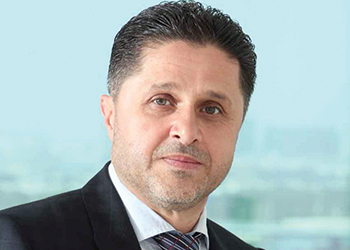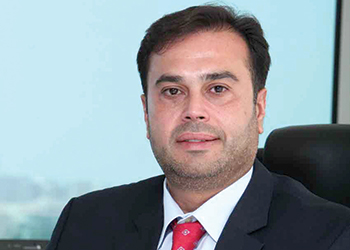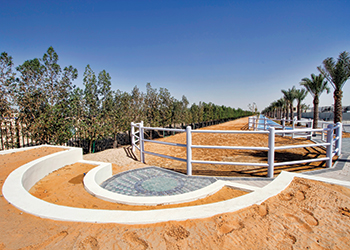Dubai city green by every measure
01 June 2015
From the design concept to the use of building materials, the 46-hectare Sustainable City has adopted green features in every step of its construction, reflecting Dubai’s green vision. It will be home to 2,700 people.
In line with Dubai’s “green” vision, an entire city that aims to embody the essence of sustainable living is fast taking shape in the UAE emirate, with the first phase set to see completion later this year.
Located in Dubailand on Al Qudra Road over 46 hectares, The Sustainable City (TSC) is being spearheaded by Diamond Developers, which indicates that work on the two-phased development is well on track to see the first phase completed in the third quarter of this year.
In the first phase, the UAE-based developer is building 500 villas in five residential clusters, a community mall, a 36,000-sq-m central green spine, an equestrian centre, and horse riding, bicycle, walking and jogging tracks. The second phase comprises Hotel Indigo InterContinental – which is an eco-resort – a country club, a green school, a 2,300-sq-m science museum and planetarium, and the sustainability centre of excellence, which is a world-class institution focused on sustainability that will monitor TSC’s environmental performance. This phase is targeted for completion in the last quarter of next year.
 |
|
Saeed |
The residential clusters, which will be fully gated, will each comprise 100 villas in 16 lots of three- and four-bedroom courtyard and garden villas with two solar-panel shaded car-parking slots and two golf cart slots (one under solar panels) per unit. The clusters will have central urban plazas with a barjeel (wind tower) and four parks for children.
The community mall comprises shops, cafes and restaurants on the periphery of an outdoor central plaza, 89 rentable apartments, offices, a healthcare clinic, a nursery, supermarket, community amenities and a Friday market.
Thanks to innovative designs and the various “green” features incorporated in their construction, the villas will boast a 75 per cent reduction in energy consumption and 40 per cent less water consumption, Wassim Adlouni, the executive director of Diamond Developers, tells Gulf Construction.
Commenting on the project, Faris Saeed, the CEO of Diamond Developers, says: “In line with the vision of His Highness Sheikh Mohammad bin Rashid Al Maktoum, Vice President, Prime Minister and Ruler of Dubai, we are thrilled to turn the vision of sustainable living in Dubai into a reality.”
The city was launched in 2014 with the support of Dubai Land Department, with a focus on sustainable living through a multitude of social, environmental and economic initiatives, he says.
TSC is a 20-minute drive to both Al Maktoum International Airport and Burj Al Arab Hotel. It will have a population of 2,700 residents.
 |
|
Adlouni |
Adlouni says TSC addresses seven key environmental elements in a bid to reduce the carbon footprint and minimise the environmental impact. These comprise passive and active design strategies and eco-friendly construction building materials; on-site production of renewable energy to meet most of the city’s needs; 100 per cent wastewater recycling for irrigation; cooler and cleaner air; urban farming; waste-sorting at source and recycling programmes; and solar-powered transportation systems.
Elaborating on these strategies, he says as part of passive design efforts, the residential units are oriented such that there are no windows on the East-West elevations to avoid direct sunlight from heating up the homes in the summer. The residential clusters are oriented in line with the prevailing wind direction in Dubai, he adds.
Active design strategies, meanwhile, have been adopted right from the masterplanning stage with materials having a solar reflective index values above 78 specified to reflect solar radiation and decrease the city’s urban heat island effect.
Turning to eco-friendly construction building materials utilised in the city, he says: “Prefabricated panels that take advantage of mass production to decrease the time needed for construction are used. These materials do not produce waste and are manufactured in an efficient manner. The reduced time needed for construction also decreases carbon emissions during the construction phase.”
To ensure energy efficiency, the project will use LED (light-emitting diode) lighting, solar water heating, high-efficiency HVAC (heating, ventilation and air-conditioning) systems, insulated walls, windows and roofs, ultraviolet (UV)-reflective paint and Energy Star rated home appliances. This apart, solar panels will be installed on the roof of every villa to produce energy.
 |
|
The horse track. |
Similarly, water consumption will be reduced by 40 per cent through the use of highly-efficient faucets, fixtures and fittings; and by featuring separate grey and black water sewage systems. The grey water will be treated on-site and reused for productive irrigation and black water reused on site for non-productive irrigation.
To ensure a cooler micro-climate, barajeels will be built to channel air into the city. Nearly 60 per cent of the project will comprise open spaces and vegetation with as many as 8,000 trees planted to purify the air and create oxygen. There will be five layers of trees in the buffer zone to prevent dust from entering the city. Apart from being a barrier to dust, the 27-m-wide buffer zone surrounding the community reduces air and noise pollution, provides shade and enhances air quality. It also consists of a horse riding track and cycle track – 4 km each – and a 3-km rubberised walking track.
Urban farming will be another sustainable feature of the project. TSC will have 11 bio-domes in total producing herbs that meet the requirements of the residents as well as vegetables and fruits; and trees in the open producing figs, pomegranate, citrus fruit, papaya and mango.
The naturally ventilated bio-domes, will each be 7 m high and encompass an area of 300 sq m. For waste management, there will be waste segregation bins for separating at source materials made of glass, plastics, metal, paper, and general and organic waste. Organic waste will be composted at Tadweer Waste Management, an integrated environmental company in Dubai, and reused as fertiliser in the urban farm.
Finally, sustainable transportation will also be a key highlight of TSC. “There will be complimentary golf carts with every residential villa charged by solar panels, to drive within the city. A $10,000 cash subsidy will be provided for residents who wish to purchase electric vehicles. In addition, electric shuttle buses will be available for residents and guests commuting within and outside the city, as well as to drop residents to the nearest metro station,” says Adlouni.
 |
|
Villas in one of the residential clusters. |
Being a pioneering project, the development no doubt threw up a number of challenges. According to Adlouni, these were primarily posed by permit issues related to sustainability with the authorities as it was the first-of-its-kind project. For example, the solar energy that would be produced was required to be connected to the grid and “had to wait Dubai Electricity and Water (Dewa) regulations, which resulted in a bit of delay to the project. However, we did receive support from Dewa as well as from other authorities like Dubai Municipality, Roads and Transport Authority (RTA), Dubai Land Department, etc,” he stresses.
Alya Alhamad, the social sustainability manager, says the project is in line with Dubai’s green economy vision. “To enhance the quality of life for its residents, TSC encourages a strong sense of community through its design, amenities, and social activities; provides advanced healthcare facilities; and will be a knowledge hub for students, academics and professionals alike,” she says.
On his part, Emil Samarah, the chief commercial officer, points out: “Contrary to general opinion, we have validated the fact that the cost of constructing sustainable developments is equivalent or even less than the cost of conventional developments.
“Furthermore, we have introduced a new concept for economic sustainability whereby a NetZero service and maintenance fee scheme is applied as a result of shared revenues from the community mall rentals.”
- Dubai city green by every measure
- Sustainable sanitary systems pay off
- Xylem powerful suction pumps save on energy
- Plans must consider safe power products
- Acoustic ceilings cap classroom clatter
- Latest tech endorse Reynaers’ leadership
- RAK Ceramics offers choice green products



